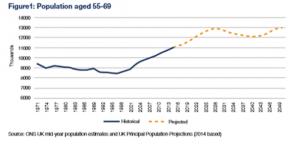
An ageing population- a problem or opportunity?
by Rebecca Clews
Today we face the impact of an ageing population but is this a problem or an opportunity for society?
Population ageing by definition is the increase in the average age of the population and the increase in the proportion and number of older people in the population. By 2030 the number of over 85s is set to have doubled (The Guardian). This poses a huge challenge to society in order to deal with the consequences of an ageing population.
 Population ageing is significantly viewed as a problem for society as it appears to work against what is seemingly needed for a productive and growing society. The financial consequences alone are likely to destabilise the existing social and political institutions as increasing pension costs and challenges to healthcare are putting a huge strain on society. It is predicted that 70% of the UK population growth between 2014 and 2039 will be in the over 60 age group (UK Government Office for Science). This arguably will create a burden on society in order to provide welfare states and adequate pensions.
Population ageing is significantly viewed as a problem for society as it appears to work against what is seemingly needed for a productive and growing society. The financial consequences alone are likely to destabilise the existing social and political institutions as increasing pension costs and challenges to healthcare are putting a huge strain on society. It is predicted that 70% of the UK population growth between 2014 and 2039 will be in the over 60 age group (UK Government Office for Science). This arguably will create a burden on society in order to provide welfare states and adequate pensions.
According to Phillipson 2013, it is a problem as the moral framework of family and community that once gave ageing security is now fragmented in today’s individualistic society. Arguably there is a contrast of interest between the older and younger generations. There is increasing pressure and a burden on the working population to provide for the ageing population with some younger people viewing the older generations as a ‘selfish welfare generation’ diverting resources from the young (Phillipson, 2013; 25). With the population ageing, more resources will have to be put aside to provide for the needs of the older generations. Therefore, ageing can be seen as both an economic problem and a source of cultural anxiety for younger generations.
Alternatively, an ageing population can be seen, rather than being a problem for society, but as being an opportunity. The fact that we are living longer is a major achievement for healthcare and welfare intervention. The increasing demand of the older population on the healthcare system is not always simply a problem but an opportunity to widen knowledge and advance medical breakthroughs. The crisis of the public healthcare system, therefore, can be seen as not a result of an ageing population but of government for inadequately preparing for it.
Ageing populations also provide new ways of thinking about social life. There are huge financial concerns, but a higher proportion of older people also results in more people working longer before retirement. There are now one million people in the UK in employment who are aged over 65 (The Guardian). Age in this context is an asset as their experience and skills are beneficial to both employers, younger employees and the economy.
Also, the contributions older generations make to communities plays a vital role in society. Nearly seven million grandparents provide regular childcare for their grandchildren in the UK (The Guardian). Not only does this relieve pressure on the state to provide childcare but also allows both parents to be economically active. For many women without this support from the older generations, they would not be able to enter the workplace in the same way as their male counterparts. An ageing population, therefore, provides opportunities for more women to enter the workplace which is beneficial both for the economy and for women as positive role models.
Whilst an ageing population does undoubtedly pose problems for society, it should not simply be viewed as a negative for society but also as an opportunity. The 90 years and overpopulation is continuing to increase despite a decline in birth rate (ONS UK Ageing). It would be naïve to suggest that this population growth of the older generations will not place a strain on the current social and political institutions and on the working population to provide for an ageing population. However, despite the problems, it may cause the extension of life acts as a positive opportunity for both medical advancement and communities within society.
These demographic changes will nonetheless change the way in which we live today and into the future as the increasing ageing population provides both problems and equally opportunities for society.

0 Comments